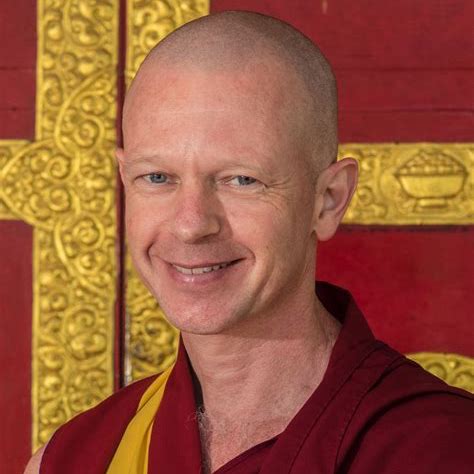An Interview with Geshe Tenzin Namdak
In this interview series, the participants of the first Science & Wisdom LIVE dialogue explore the theme of Destructive Emotions. This week we share the thoughts and insights of Venerable Geshe Tenzin Namdak.
Geshe Namdak is the resident teacher at Jamyang Buddhist Centre, London, and is internationally known for his teaching on Buddhist ethics, philosophy and psychology.
“We should stand back and ask what is really essential in our lives.”
What are destructive emotions? Can you give an example of how they affect our well-being?
A destructive emotion is a mental factor that, when it arises, has the characteristic of being very unpeaceful. Moreover, due to its arising, the whole mind becomes unpeaceful. So not only negative emotions cause a disturbance, but they also impact our capacity to reason with clarity. This inevitably makes problem solving difficult. If they are not under our control, negative emotions can cause an emotional hijack. This in turn leads to a negative verbal or physical act and thus has the potential to harm others as well. For example, an intense state of aversion or anger disturbs one’s mind and can cause one to engage in verbal abuse, or even a physical act of violence.
How does our perception of reality influence our emotions? Could you give an example that draws upon a contemporary problem?
When destructive emotions arise, our peace of mind is lost. In addition, it will also cause a distorted view of that which is perceived, which makes problem solving very difficult. For example, anger overestimates the faults of its object without seeing its qualities. It is a mental factor that causes malice toward others. It seeks to be separated from its object and acts as a support for misconduct. When anger arises in our mind and someone tries to calm us down by saying that the person we are angry at also did good things, we do not like to hear that. We generate a mental image of the object of anger in which we only see faults. The image in our mind is not the actual person we are angry at. It is a mental fabrication which we mistake for reality. For example, let’s say a person has 70% qualities and maybe 30% faults. However, when we get angry at such a person he/she appears to have 90% faults! Therefore, we can conclude that the mental image we have of that individual is not the reality: it is mentally fabricated. Strong desire on the other hand, overestimates the qualities of its object without seeing the faults; it is a mental factor that perceives something to be attractive and thereupon seeks it. Because of over estimating the qualities of the object, expectations are never met and thus there is no satisfaction.
“In order to establish a mentally healthy, peaceful and happy society we need inner development, not economic growth.”
How could contemplative practices help us tackle destructive emotions, and develop a positive vision of reality to face challenges like the Covid-19 pandemic?
Ancient contemplative traditions can offer education in mind science. Buddhist psychology, for example, as taught by the Buddha and elucidated by the scholars of Nalanda of India, is a science of the mind that explains methods to eliminate destructive emotions. This is done through mind training that generate greater self-awareness, self-discipline, and altruism. Destructive emotions—like anger, desire, and ignorance—can be eliminated with methods that use our human intelligence to analyse their faults, as well as the qualities of constructive emotions in sustained contemplation.
In a similar way, Buddhist psychology can help us deal with other problems we face in life. For example, dealing with fear during the Covid-19 pandemic and so forth. Fear is often based on not knowing reality as it is. The distorted image of reality that fear creates our mind is not to be found out there. Understanding and accepting reality can prevent mental suffering of fear and worry. For example, if we have a problem and we can do something about it, then we should act – so there is absolutely no need to worry. On the other hand, there are problems we cannot do anything about, like difficulties we face with ageing. Such problems we must accept, so we do not need to worry about them either!
The teachings on altruism teach us about universal responsibility. We are all human beings living on the same planet together and we should work together to solve problems like Covid-19, environmental issues and so forth.
What are the most pressing issues related to destructive emotions and distorted perceptions? Which obstacles would science and contemplative traditions need to overcome in order to tackle them?
Two main issues can be addressed. Firstly, the need for human values and universal responsibility. We need to work together, as human brothers and sisters sharing the same planet, to solve problems like war, human rights, racism, climate change and so forth. Emotions like self-concern and self-centeredness cause problems on local and global levels, because we view our fellow humans as ‘us’ or ‘them’. This has a tendency to generate aversion to others. When conflicts arise, they should be settled through dialogue, not by using force, since violence leads to counter violence.
Contemplative practices, which include altruism and peaceful solutions, can bring great benefits and facilitate such dialogues. Another issue to be addressed is mental health. We should stand back and ask what is really essential in our lives. In order to establish a mentally healthy, peaceful and happy society we need inner development, not economic growth. Of course, we need good living conditions, which are mostly created through technologic development. But to increase mental well-being, contemplative traditions do have a lot more to offer! The effectiveness of contemplative practices can be examined through scientific research, after which training programs can be developed to study these benefits further.
How would you describe the following terms, in just one sentence?
Meditation/Mindfulness: Transformation of destructive emotions into a positive habituation of constructive emotions leading to mental well-being and ethical and altruistic behaviour.
Ethical learning: Methods to motivate one’s physical and verbal moral behaviours to create a harmonious and constructive environment for communication and working and living together.
Emotional education: Education of the mind, learning to generate more awareness, mindfulness, self-discipline, and developing constructive emotions to achieve inner well-being.
On the 11th of November, Geshe Tenzin Namdak will join Dr. Elena Antonova, Fr. Laurence Freeman and Dr. Wendy Hasenkamp, to discuss how scientific research and meditation techniques can help us deal with destructive emotions in these challenging times.
Please join this Science & Wisdom Live dialogue on Zoom on the 11th of November, 7pm GMT (UK Time). *Reserve your tickets here!*



